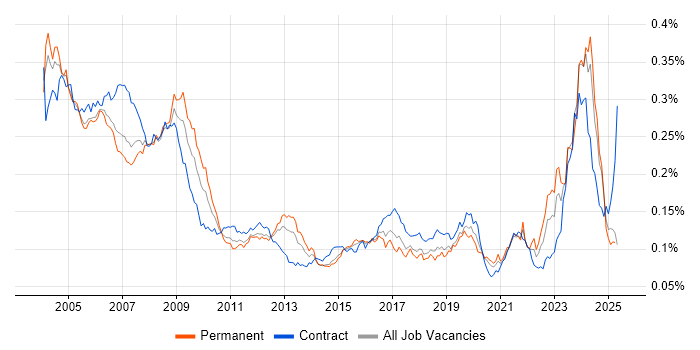Hardware Engineer
UK
The median Hardware Engineer salary in the UK is £48,000 per year, according to job vacancies posted during the 6 months leading to 10 May 2025.
The table below provides salary benchmarking and summary statistics, comparing them to the same period in the previous two years.
| 6 months to 10 May 2025 |
Same period 2024 | Same period 2023 | |
|---|---|---|---|
| Rank | 647 | 518 | 772 |
| Rank change year-on-year | -129 | +254 | +286 |
| Permanent jobs requiring a Hardware Engineer | 53 | 425 | 202 |
| As % of all permanent jobs advertised in the UK | 0.097% | 0.43% | 0.20% |
| As % of the Job Titles category | 0.11% | 0.45% | 0.22% |
| Number of salaries quoted | 35 | 312 | 50 |
| 10th Percentile | £34,750 | £22,750 | £23,650 |
| 25th Percentile | £42,375 | £35,188 | £25,125 |
| Median annual salary (50th Percentile) | £48,000 | £50,000 | £40,000 |
| Median % change year-on-year | -4.00% | +25.00% | +32.62% |
| 75th Percentile | £57,500 | £60,313 | £62,500 |
| 90th Percentile | £63,500 | £68,625 | £77,500 |
| UK excluding London median annual salary | £48,000 | £50,000 | £41,500 |
| % change year-on-year | -4.00% | +20.48% | +43.10% |
All Permanent IT Job Vacancies
UK
For comparison with the information above, the following table provides summary statistics for all permanent IT job vacancies. Most job vacancies include a discernible job title that can be normalized. As such, the figures in the second row provide an indication of the number of permanent jobs in our overall sample.
| Permanent vacancies in the UK with a recognized job title | 49,356 | 93,784 | 92,686 |
| % of permanent jobs with a recognized job title | 90.47% | 94.63% | 91.46% |
| Number of salaries quoted | 27,595 | 67,216 | 58,370 |
| 10th Percentile | £30,000 | £28,500 | £32,500 |
| 25th Percentile | £41,250 | £38,500 | £45,000 |
| Median annual salary (50th Percentile) | £57,500 | £52,500 | £60,000 |
| Median % change year-on-year | +9.52% | -12.50% | - |
| 75th Percentile | £75,000 | £71,250 | £81,250 |
| 90th Percentile | £97,500 | £90,000 | £100,000 |
| UK excluding London median annual salary | £52,000 | £50,000 | £53,000 |
| % change year-on-year | +4.00% | -5.66% | +6.00% |
Hardware Engineer
Job Vacancy Trend
Job postings that featured Hardware Engineer in the job title as a proportion of all IT jobs advertised.

Hardware Engineer
Salary Trend
3-month moving average salary quoted in jobs citing Hardware Engineer.
Hardware Engineer
Salary Histogram
Salary distribution for jobs citing Hardware Engineer over the 6 months to 10 May 2025.
Hardware Engineer
Top 13 Job Locations
The table below looks at the demand and provides a guide to the median salaries quoted in IT jobs citing Hardware Engineer within the UK over the 6 months to 10 May 2025. The 'Rank Change' column provides an indication of the change in demand within each location based on the same 6 month period last year.
| Location | Rank Change on Same Period Last Year |
Matching Permanent IT Job Ads |
Median Salary Past 6 Months |
Median Salary % Change on Same Period Last Year |
Live Jobs |
|---|---|---|---|---|---|
| UK excluding London | -123 | 51 | £48,000 | -4.00% | 118 |
| England | -166 | 46 | £48,000 | -4.00% | 132 |
| South East | +2 | 25 | £48,000 | +19.25% | 53 |
| Work from Home | +77 | 16 | £48,750 | -2.50% | 53 |
| Midlands | +14 | 8 | £38,750 | -32.61% | 9 |
| North of England | +5 | 6 | £37,500 | +47.06% | 11 |
| Scotland | +124 | 5 | - | - | 4 |
| East Midlands | +40 | 5 | £35,000 | -30.00% | 3 |
| East of England | -37 | 4 | £55,000 | - | 41 |
| South West | +64 | 3 | £52,000 | +9.47% | 9 |
| Yorkshire | +62 | 3 | - | - | 5 |
| West Midlands | +6 | 3 | £42,500 | -27.66% | 6 |
| North West | -39 | 3 | £37,500 | +65.56% | 6 |
Hardware Engineer Skill Set
Top 30 Co-occurring Skills and Capabilities
For the 6 months to 10 May 2025, Hardware Engineer job roles required the following skills and capabilities in order of popularity. The figures indicate the absolute number co-occurrences and as a proportion of all permanent job ads featuring Hardware Engineer in the job title.
|
|
Hardware Engineer Skill Set
Co-occurring Skills and Capabilities by Category
The follow tables expand on the table above by listing co-occurrences grouped by category. The same employment type, locality and period is covered with up to 20 co-occurrences shown in each of the following categories:
|
|
|||||||||||||||||||||||||||||||||||||||||||||||||||||||||||||||||||||||||||
|
|
|||||||||||||||||||||||||||||||||||||||||||||||||||||||||||||||||||||||||||
|
|
|||||||||||||||||||||||||||||||||||||||||||||||||||||||||||||||||||||||||||
|
|
|||||||||||||||||||||||||||||||||||||||||||||||||||||||||||||||||||||||||||
|
|
|||||||||||||||||||||||||||||||||||||||||||||||||||||||||||||||||||||||||||
|
|
|||||||||||||||||||||||||||||||||||||||||||||||||||||||||||||||||||||||||||
|
|
|||||||||||||||||||||||||||||||||||||||||||||||||||||||||||||||||||||||||||
|
|
|||||||||||||||||||||||||||||||||||||||||||||||||||||||||||||||||||||||||||
